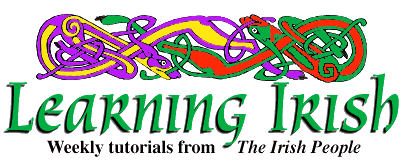
Irish Lesson 33
|
PRONUNCIATION The vowel "ó" in Irish is a pure vowel, without the trace of (ay) sound beginning it or (oo) sound following it that the English (o) might have. The Irish sound for "o" usually appears in an accented syllable. The "ó" is held longer than is the (oh) in the English word "roll", for example. In the south of Ireland, "ó" may be pronounced more like (oo) in words such as: nó, mór, mó, móna. If an accented "o" has no síneadh fada, it gets the same sound as "ó", but the sound is not held as long. Examples: obair, oscail, ocht, cnoc. Do not substitute an (uh) sound for this vowel.
GRAMMAR As English does, Irish forms adjectives from verbs. Usually the basic form of the verb is modified with "‹tá" or "‹te". Examples: dún (doon), close, gives us dúnta, closed déan, do, gives us déanta, done múin (MOO-in), teach, gives us múinte, taught buail, strike, gives us buailte (BOO-il-te), struck If the last vowel in the verb is "a, o, u" then use "‹ta" because the "t" must be broad. If the last vowel in the word is "e, i" then use "‹te", because the "t" must be slender. Sometimes the added "t" is aspirated to give a (huh) or (he) sound at word end. In a few cases, such as "scríofa", the "t" becomes an "f", because that is the natural sound of "bhth" together: a (v) plus an (h). Here are some of these "verbal adjectives". Read them and deduce their meanings before you look down at the Key at the end of the Grammar section: bainte (BWIN-te), ceannaithe (KAN-i-he), díolta (DEE-uhl-tuh), creidte (KRED-te), tuigthe (TIG-he), deisithe (DESH-i-he), ólta (OHL-tuh), imithe (IM-i-he). From now on, as you learn new verbs, try to picture the verbal adjective. Although you will be incorrect on the aspiration of the "t" for some of the endings, you will be able to get most of them.
These verbal adjectives combine with the word "ag" (eg), at, to allow you to say "I have read the letter" instead of "I read the letter". The Irish form is "Tá an litir léite agam" (taw* un LI-tir LAY*-te uh-GUHM), meaning literally: "The letter is read at me." Read these sentences over slowly and note how the word order is changed from English: Tá an bainne ólta agam (taw* un BAHN-ye OHL-tuh uh-GUHM), I have drunk the milk. Tá an bhróg deisithe aige (eg-GE), He has mended the shoe. Níl an scéal creidte ag Bríd, Bridget has not believed the story. An bhfuil do theach (do HAHK*) díolta agat? Have you sold your house? The order is changed in the same way that it is in "Tá bord agam", meaning literally: "A table is at me", but actually, "I have a table." Key: Meanings of the verbal adjectives above: removed or reaped, bought, sold, believed, understood, repaired, drunk, departed or gone.
VOCABULARY Masculine nouns buíochas (BWEE-uhk*-uhs), thanks crann (kroun), tree siopa (SHOP-uh), store, shop Feminine nouns aghaidh, an aghaidh (EYE-ee, un EYE-ee), face gruaig, an ghruaig (GROO-ig, un GROO-ig), hair Verbs feic, ag feiceáil (fek, uh FEK-aw*-il), see chonaic mé (k*uh-NIK may*), I saw ní fhaca mé (nee AH-kuh may*), I didn't see an bhfaca tú? (un VAH-kuh too), did you see? nach bhfaca tú? (nahk* VAH-kah too), didn't you see? clois, ag cloistéail (klish, uh KLISH-taw*-il) hear chuala mé (K*OO-uh-luh may*), I heard níor chuala mé, I didn't hear. ar chuala tú? Did you hear? nár chuala tú? Didn't you hear? cíor, ag cíoradh (KEE-uhr, uh KEE-uh) comb nigh, ag ní (ni, uh NEE), wash Note: "feic" and "clois" are irregular in the past tense. These are two more to add to "tar", come, and "téigh", go.
DRILL The irregular verbs with highly different forms in the past tense require considerable drill if you are to become fluent in Irish. 1. Go through a progressive drill with "chonaic", etc: An bhfaca mé an bhean (van)? Ní fhaca mé an bhean. Chonaic tú an bhean. An bhfaca tú an bhean? Ní fhaca tú an bhean. Chonaic sé an bhean. An bhfaca sé an bhean? Ní fhaca sé an bhean. Etc. The last sentence will be: Chonaic mé an bhean. "Chonaiceamar" and "ní fhacamar" are the "we" forms. 2. Go through a progressive drill with "chuala", etc.: Ar chuala mé an traein? Níor chuala mé an traein. Chuala tú an traein. Ar chuala tú an traein? Etc. The last sentence will be: Chuala mé an traein. "Chualamar" and "níor chualamar" are the "we" forms. 3. Make sentences of the type, "I have seen the garden", from these groups of words (Follow this example: dún; dúnta; doras; an cailín. Tá an doras dúnta ag an gcailín; the girl has closed the door.): stad; stadta; carr; mé cíor; cíortha; a gruaig; sí glan; glanta; an tsráid; Seán caill; caillte; a cóta; Úna scríobh; scríofa; scéal; sé feic, feicthe; buachaill; Bríd tuill; tuillte; airgead; sinn tuig; tuigthe; an fear; an leanbh Sample answer: Tá an carr stadta agam. I have stopped the car.
(c) 1997 The Irish People. May be reprinted with credit. |